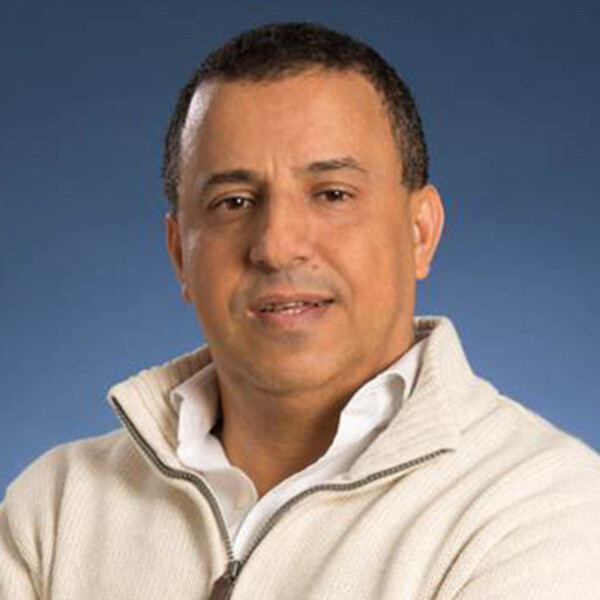Razqallah Hakem
PhD

Dr. Hakem is a Senior Scientist at the Princess Margaret Cancer Centre. He received his Ph.D degree from the University of Aix-Marseille II, France. He completed post-doctoral training at Howard Hughes Medical Institute/Washington University Medical School, Saint Louis in the US and the Amgen Research Institute in Toronto.
Dr. Hakem started his faculty position in 1998 and focused the research of his laboratory on cancer mechanisms. Using cancer genetics he has identified novel tumor suppressor genes (e.g. RNF8, MUS81 and PIRH2) and has also investigated the mechanisms of function and regulation of some major human tumor suppressor genes (e.g. BRCA1 and P53). Dr. Hakem is a world-class expert in cancer genetics, cell signaling and molecular oncology.
Several of his former trainees have obtained faculty positions or important positions in the private sectors.
Research Synopsis
The focus of our research is to characterize novel genetic risk factors, cell signaling and molecular oncology mechanisms that drive development and progression of human cancer. We also aim to identify novel strategies to improve cancer therapy.
Deregulation of cell signaling pathways not only impairs development and differentiation; it also frequently drives the development of human cancers. Therefore, our laboratory is investigating the role in cancer of different key siganling pathways including the DNA damage response, NOTCH, WNT, and the HIPPO pathways.
Cancer genetics and biochemistry are fundamental to our research. Mouse models, murine and human tumor lines that we have generated, and biopsies from cancer patients are being employed to conduct our studies. Using a multidisciplinary approach that involves scientists, clinicians, pathologists and bioinformatics experts we work towards our long-term goal of contributing to better diagnosis and therapy for cancer patients.
Positions are available for prospective graduate students and for postdoctoral trainees. We welcome applications from highly motivated candidates. Applicants should contact Professor Hakem.
Recent Publications
Hakem, R., de la Pompa, J.L., Sirard, C., Mo, R., Woo, M., Hakem, A., Wakeham, A., Potter, J., Reitmair, A,. Billia., F., Firpo, E., Hui, C.C., Roberts, J., Rossant, J., and Mak, T.W. (1996). The tumor suppressor Brca1 is required for embryonic cellular proliferation in the mouse. Cell, 85: 1009-1023.
McPherson, J. P., Lemmers, B., Chahwan, R., Pamidi, A., Migon, E., Matysiak-Zablocki, E., Moynahan, M. E., Essers, J., Hanada, K., Poonepalli, A., Sanchez-Sweatman, O., Khokha, R., Kanaar, R., Jasin, M., Hande, M. P., and Hakem, R. (2004). Involvement of mammalian Mus81 in genome integrity and tumor suppression. Science, 304: 1822-1826.
McPherson, J. P., Lemmers, B., Hirao, A., Hakem, A., Abraham, J., Migon, E., Matysiak-Zablocki, E., Tamblyn, L., Sanchez-Sweatman, O., Khokha, R., Squire, J., Hande, M. P., Mak, T. W., and Hakem, R. (2004). Collaboration of Brca1 and Chk2 in tumorigenesis. Genes & Dev, 18: 1144-1153.
Salmena, L. and Hakem, R. (2005). Caspase-8 deficiency in T cells leads to a lethal lymphoinfiltrative immune disorder. The Journal of Experimental Medicine, 202: 727-732.
Li, L., Halaby, M. J., Hakem, A., Cardoso, R., El Ghamrasni, S., Harding, S., Chan, N., Bristow, R., Sanchez, O., Durocher, D., Hakem, R. (2010). Rnf8 deficiency impairs class switch recombination, spermatogenesis, genomic integrity and predisposes for cancer. The Journal of Experimental Medicine. 207:983-97
Bohgaki, T., Bohgaki, M., Cardoso, R., Panier, S., Stewart, G.S., Sanchez, O., Durocher, D., Hakem, A. and Hakem, R. (2011). Genomic instability, defective spermatogenesis, immunodeficiency and cancer in a mouse model of the RIDDLE syndrome. PLoS Genet. April; 7(4): e1001381
Hakem, A., Bohgaki, M., Lemmers, B., Tai, E., Leonardo Salmena, L., Elzbieta Matysiak-Zablocki, E., Bähr, W. I. L., Karaskova, J., Boutros, P, Sheng, Y., Arrowsmith, C., Chesi, M., Bergsagel P. L., Perez-Ordonez, B., Squire, J., Jurisica, I., Penn, L., Sanchez, O., Benchimol, S. & Hakem, R. (2011). Pirh2 is a critical negative regulator balancing opposing p53 and c-Myc induced oncogenic pathways. PLoS Genet. Nov;7(11): e1002360.
Bohgaki, T., Salmena, L., Matysiak-Zablocki, E., Bohgaki, M., Sanchez, O., Strasser, A., Hakem, A. and Hakem, R. (2011). Caspase-8 Inactivation in T-cells Increases Necroptosis and Suppresses Autoimmunity Associated with Bim Deficiency. The Journal of Cell Biology. 195(2):277-91.
Hakem, A., El Ghamrasni, S., Maire, G., Lemmers, B., Salmena, L., Karaskova, J., Perez-Ordonez, B., Sanchez, O., Squire, J. and Hakem, R. (2012). Role of Casp8 in Cytokinesis, Genomic Integrity and Cancer. Blood. 119, p3495.
Halaby MJ, Hakem A, Li L, El Ghamrasni S, Venkatesan S, Hande P, Sanchez O and Hakem R. Synergistic interaction of Rnf8 and p53 in the protection against genomic instability and tumorigenesis. (2013). PLoS Genet. 2013;9(1):e1003259.
Bohgaki M, Bohgaki M, Srikumar T, Maire G, Panier S, Stewart G, Raught R, Hakem A and Hakem R. RNF168 Ubiquitylates 53BP1 and Controls Its Responses to DNA Double-Strand Breaks. (2013). PNAS 110(52):20982-7.
El Ghamrasni S, Cardoso R, Halaby MJ, Zeegers D, Harding S, Kumareswaran R, Yavorska T, Chami N, Jurisicova A, Sanchez O, Hande MP, Bristow R, Hakem R, Hakem A. Cooperation of Blm and Mus81 in development, fertility, genomic integrity and cancer suppression. (2015). Oncogene. 34(14):1780-9.
El Ghamrasni S, Cardoso R, Bjerregaard V, Liu Y, Venkatesan S, Hande MP, Henderson J, Hickson I, Sanchez O, Hakem A and Hakem R. Rad54 and Mus81 cooperation promotes DNA damage repair and restrains genomic instability and chromosome missegregation. (2016). Oncogene. In press.
